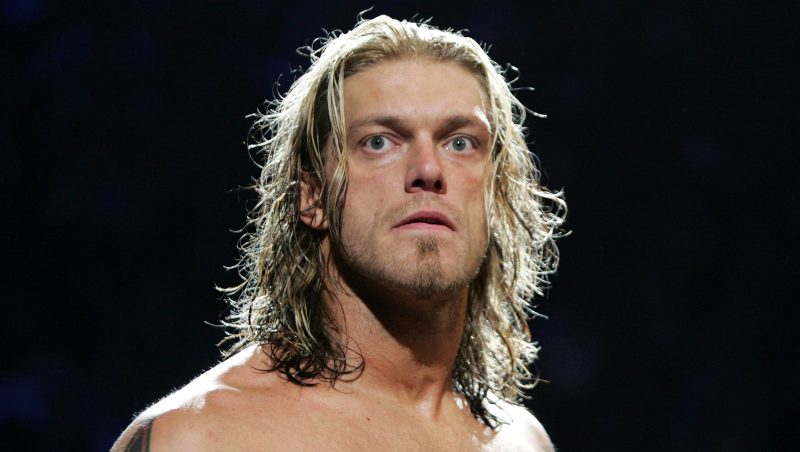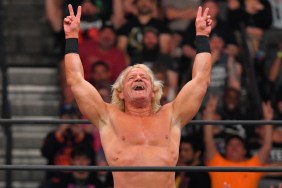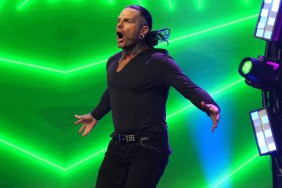Edge was the latest guest on Prime Time with Sean Mooney and talked about his 20-year professional wrestling journey. He and Mooney tackled several topics including being raised by single mothers, Edge meeting a ninja-star wielding Christian back in sixth grade, his career highlights, advice given to him by wrestling stars throughout his career and his transition into acting. Below are some quotes from the very in-depth interview (transcription credit should go to Dominic DeAngelo at WrestleZone – some of the transcription has been edited for length and clarity):
Edge on his and Christian’s storybook friendship:
“Just so happened to find two people – same mindset, same drive, same goal. That to me is the crazy part. and he fact that we stuck to it is because we had each other to lean on throughout the years, but to get there, to go through all the training, to wrestle in the barns in Fall Branch, TN and go through all of that stuff and then eventually at WrestleMania 16 to be standing there on top of the table holding the tag team belts, just all very, very surreal at times.”
On training at Sully’s Boxing Gym in Parkdale, Toronto:
“So go down there, like I said this rough neighborhood, Parkdale, I mean at this point, there’s hookers, there’s pimps – it’s a bad, bad neighborhood at this point. It’s since gentrified but at the time it was rough. So I go down to this beat up old thing called Sully’s gym and it’s straight out of Rocky. Like I expected to see Mick there or Stallone walking with his racquetball. So we trained in a boxing ring.”
“With a wrestling ring, it’s bigger. There’s a little bit more give, not much, but a little bit, but boxing this thing, it was a concrete block. It made every ring after that seem like a dream.”
On how he viewed wrestling as a career:
“To me I didn’t look at wrestling as a way out or a way to be rich and famous. Wrestling to me was always just something I had to do, and if that came great.”
On if he took to wrestling easy:
“I didn’t feel like a natural. The footwork was new, I’d never taken dance or anything like that but I did box for a couple of years, but the footwork was different. Boxing was being on your toes, this was having a good base.”
On the importance of his mom’s support:
“To her eternal credit, she never once doubted me, at least to me. She might have to herself and just never vocalized that to me. But from the point I said I wanted to do it, she was nothing but supportive and that was huge because, you know, you tell your parents that you want to essentially pursue this pipe dream and I think anybody who gets into entertainment has this same conversation with their parents at some point.”
On why he took television and radio in college:
“I took television and radio and I thought it would help me break out of my shyness. I truly thought it would help me with my promo skills. It was my main reasoning for taking it. I was like ‘yeah, it could be a fallback option’, but to me there wasn’t a fallback option. It had to be that, there was no other choice and it was always going to be that. I don’t know, I’ve always said I think there’s a difference between cockiness and confidence, but I truly always had the confidence in that I was gonna make it. Whatever my version of ‘make it’ was, at that time it was ‘get to the WWF.’ That to me was the goal and I was going to get there. So I wanted to come in with as many tools in the tool belt as I could, and where I felt lacking in the shows that I’d done, was confidence on the mic, confidence with just coming out of my shell.
“But If you were to hand me a microphone it was not going to be pretty and I knew that was the part of my game I needed to work on and I thought radio would help just in terms of my cadence, my inflections, my timing because if you gotta do a live spot, it may be 2 am on Humber College radio, but I still want to hit that 30 second spot, and I think it did help. Eventually, I got to where I was really comfortable on the mic, but I think that helped a little bit.”
On when he knew he had something in wrestling:
“And eventually, got up to Winnipeg and that’s where I ran into guys like Lance Storm and ‘Bad News’ Brown. Names that had been around. And when a guy like ‘Bad News’ Brown takes an interest, I’m like ‘okay, well I must be onto something here’ or if I go up to the east coast Rick Martel would request to work me I’m like ‘alright this means something. This means that I’m safe and that they must see something. Whether it’s a drive or whether it’s the fact that I was wide open to just listening and if I asked advice I would then implement it. I wasn’t just asking it because that seemed like the political thing to do.”








